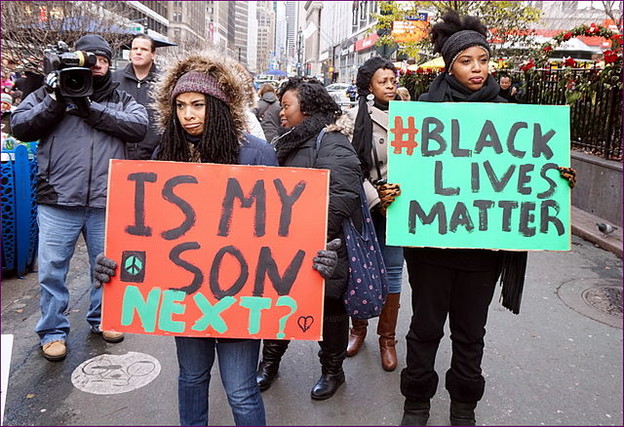Black words matter

Towards the end of 2014, Writers in Baltimore Schools, a non-profit organization, held a write-in to give students a chance to explore and process their responses to the death of Mike Brown and the protests in Ferguson, Missouri. The event yielded the Black Words Matter blog, where some of the poems from the event are archived. The students' work explores a range of themes from slavery to police brutality to the history of Jim Crow.
Afiya Ervin, one of the student poets, writes in her poem "I've finally started writing":
I’ve finally started writing because hopefully one day the scratches
Of my pen can uplift the mother, uplift the
Country, and uplift our people above the wet, dark backs of our
Ancestors and break the chains we’ve been carrying since we were taken
From our African Empires to work for the stripes and stars that have
Held us down for centuries.
Ervin's poem links contemporary forms of violence against black bodies with their historical precedents: the Transatlantic slave trade and a history of disenfranchisment for black people in the United States. Her first few lines, which link writing to racial uplift, recall the opening of Alain Locke's forward to The New Negro (1925), his collection of essays, poetry, and prose intended to represent new writing emerging from the Harlem Renaissance. Locke links artistic expression to self-determination for black people by suggesting that culture, art, and literature speak to the humanity that has been denied to them. Like Ervin, he identifies a connection between racial uplift and the act of writing, suggesting the transformative power of the written word and its ability to effect change.
More recently, Ervin and others were featured in a Baltimore Sun article on the recent unrest in Baltimore as they assembled for another Black Words Matter write-in, this time in honor of Freddie Gray, the Baltimore man whose death has been attributed to six police officers. Ervin told a reporter, "With Ferguson, if I didn't want to deal with it, I could shut my laptop and not deal with it...I can't just shut it out of my world this time, because this is my world." In response to the events in Baltimore, she wrote a poem called "I almost forgot":
When I turned on the TV, I almost forgot how bright Baltimore was
Because now the flames from cop cars and CVS blocked the way sun danced on the looters faces
The lights and cameras flashed too bright and stunned me from seeing the way the father was only taking toilet paper and milk or any other necessity his family needed
The helicopter was too loud and left a ringing in my ears
So that I can not hear the screams from every Baltimorean asking, crying, and begging for justice
Here, Ervin speaks to the difference between her own perceptions of Baltimore and its representation in mainstream media. Baltimore on television does not look like her Baltimore, a city in the middle of protests. The cameras and lights of the media shift her perception of a man taking necessities from a CVS store, positioning him as one of the "looters." In the sounds of the melee, through the lens of a news report, she hears not the protesters' voices demanding justice but the sounds of helicopters. She dismantles representation to reframe the needs of people in Baltimore beyond the glare of the media. In Ervin's work we find new perspectives on contemporary racial politics in the United States, as told through the eyes of a 16-year old high school student.
Image credit: "Black Lives Matter protest" by The All-Nite Images - https://www.flickr.com/photos/otto-yamamoto/15305646874/. Licensed under CC BY-SA 2.0 via Wikimedia Commons - http://commons.wikimedia.org/wiki/File:Black_Lives_Matter_protest.jpg#/m...
Postcolonial digital poetics